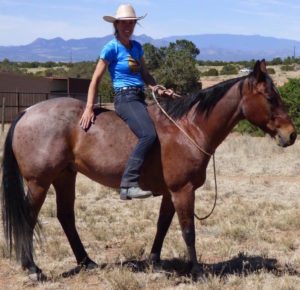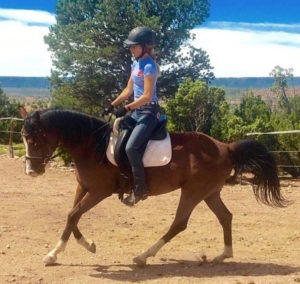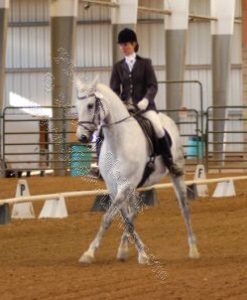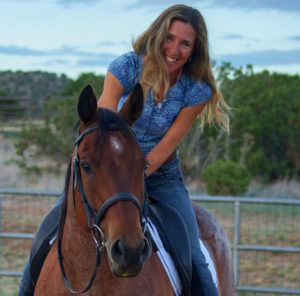 Editor’s Note: 2018 Best Horse Practices Summit presenter Katrin Silva grew up riding dressage in Germany before moving to the United States at age 19 to learn to ride Western. She’s been riding both disciplines for the last twenty years and is a regular guest columnist for Cayuse Communications. She lives in New Mexico where she works with dressage and Western clients. Visit her blog here.
Editor’s Note: 2018 Best Horse Practices Summit presenter Katrin Silva grew up riding dressage in Germany before moving to the United States at age 19 to learn to ride Western. She’s been riding both disciplines for the last twenty years and is a regular guest columnist for Cayuse Communications. She lives in New Mexico where she works with dressage and Western clients. Visit her blog here.
Silva writes:
My chosen career as horse trainer has its share of ethical issues. For instance, when owners have difficulty with their equine partner, they look to professionals for guidance. Sometimes, the first thing they hear is that in order to reach their goals, they should get rid of the horse they currently own and replace it with one better suited for what they’re trying to accomplish. Trainers, especially those who compete, are notorious for breaking up established horse-rider combinations. Dressage trainers push their students to buy horses with loftier gaits. Western trainers steer them toward more talented reining or ranch riding horses. Some trainers tell their students to look for a different horse – an older, younger, bigger, smaller, less skittish or more confident horse, a gaited horse or a non-gaited horse, a horse of a different breed, a different disposition, a different gender.

Katrin Silva
This is not always wrong. Just like divorce is sometimes the best option for a bad marriage, a new horse can be the best solution for a problematic horse-rider relationship. Some horse-rider combinations are accidents waiting to happen – a total mismatch in personalities, and/or temperaments. Green horses need experienced riders, yet the most inexperienced riders often end up with the greenest horses. Some trainers who recommend a divorce do so for safety concerns, not for a more insidious reason.
There are other times when a rider’s ambitions are very specific: to earn a silver medal in dressage or to complete the Tevis Cup. It’s not realistic to expect to get there on a horse that does not look or move the part Maybe better: “a horse that does not have enough athletic talent or the right hind of movement. It’s not fair to the horse, either.
Other times, though, trainers recommend a change in horse to change horses? for reasons that have more to do with trainer ego or wallet than with the student’s or the horse’s welfare. Sale commissions can be an important source of income for many trainers. Some are hard earned, but buying and selling horses creates a conflict of interest. Be a little bit suspicious if a trainer you’re working with tells you to sell your horse. Be more suspicious if she just happens to have the perfect replacement.
 Even if a trainer does not profit financially, ego still can play a big role. Consciously or subconsciously, many trainers are looking for a horse that will make them look good, but that might not be the best horse for the student. Other times, if the trainer has tried to work with a horse without success, it’s hard to admit what looks like failure. Rather than saying, “You know what? Your horse and I just don’t get along.” it’s easier to say “Sell this one, and let’s start over.”
Even if a trainer does not profit financially, ego still can play a big role. Consciously or subconsciously, many trainers are looking for a horse that will make them look good, but that might not be the best horse for the student. Other times, if the trainer has tried to work with a horse without success, it’s hard to admit what looks like failure. Rather than saying, “You know what? Your horse and I just don’t get along.” it’s easier to say “Sell this one, and let’s start over.”
I never buy, sell, or market horses. Mainly, it’s because I’m not a good saleswoman. But I also don’t want to deal with the ethics of being a trainer and a trader simultaneously. After almost 30 years in the horse business, I try to make existing horse-rider relationships work whenever possible. My first concern is centered on the horse’s welfare: once a horse gets sold because he couldn’t get along, his prospects for a long and happy life become dire.
What if safety really is a concern?
If the owner is willing to spend the time, these challenging relationships can blossom.
What if a rider has goals that the horse can’t fulfill?
Again, it may be fair and kind to change horses. Other times, a horse owner’s goals may become flexible: one of my clients adopted an off-the track thoroughbred mare. Her main goal was to give that horse a second chance and a good general education. Now, the horse is becoming a lovely dressage horse, and the owner is becoming a lovely dressage rider. It was unplanned and enjoyable. They have become a happy pair.
My final point: investing time and effort into an existing horse-rider relationship can be rewarding for everyone involved:
The horse gets a solid education.
The owner gets to enjoy a journey with an evolving, improving equine partner and almost certainly learns to become a better rider along the way.
The trainer enjoys nurturing horse-rider combinations instead of breaking them up.
Helping horses and people get along better is the main reason why I do what I do. It’s what I think about on my way home from the barn. It’s what gets me back to the barn every morning, ready to put my heart and mind into my job.
Thank you, all my students and clients, past and present, who have given me the opportunity to work with so many types of horses. Thank you, especially, for the challenging, difficult, complicated equine individuals you’ve introduced me to over the years. You’ve made their lives better, and hopefully improved your understanding horsemanship along the way. I know you’ve improved mine.

thank you for this. I have a mare that I struggle with for many reasons. I am lucky to have a husband that is letting us figure it out. I see glimpses of what we could be if we both work on our issues! this spring and summer we are devoting the time to it to see what we can be with the help of trainers for both of us.
I got a horse that took me on a very different journey than what I had planned. He would comply only reluctantly, and had three major medical issues, a random bad luck of the draw apical tooth root infection complicated by major sinus infection, and two deep tissue injuries, which gave us way more time for the groundwork I enjoyed doing, and playing some communication games unrelated to riding but that we both seemed to connect better through.
Last October, I had a standing MRI done for navicular, which revealed severe bone degeneration in both front feet. He’s now happily retired at 15, and I’ll keep him as comfortable as possible for as long as possible. I lost my leg last November in a traumatic accident (Mack truck, not horse-related), and our foundation of communication on the ground made for a seamless transition to same communication, I’m just in a wheelchair now.
I have reluctantly learned patience and how to value what a horse thinks, while keeping his behavior safe as he navigates in a human-dominated world.
Friend, not a means to an end, has given me way more than sports goals for both of us.
That’s lovely, Lauren. (Not that you lose your leg.) You found joy in what you have. I feel a special love for you. Best wishes for you both.
Melanie, I hope you and your mare develop the partnership you envision. It sounds like youre on the right track. Best of luck!
Wow. It sounds like you and your horse have been through a lot – I can’t even begin to imagine the trauma of losing a part of your body and so much mobility along with it. It also sounds like you and your horse have a very solid relationship, in spite of all the physical issues both of you are dealing with. Hugs to you!
Very wonderful article, Katrin! I love your passion for horses and putting them first. It sure is easy to get hooked into vanity but the true joy is so much more than blue ribbons and accolades. To be in the presence of these beautiful horses and share a line of communication is beyond sublime. It is heaven!
Thank you, Debra! It’s been an evolution for me. I never considered horses a means to an end, but I used to ride in shows a lot more than I do now. I used to walk away happy when I did well, and crushed when I didn’t, which was often. I thought, naively, that the best trainers placed on top. Now, I realize that it’s a lot more complicated. I still show, but not as much, and I never allow it to suck the joy out of my riding.